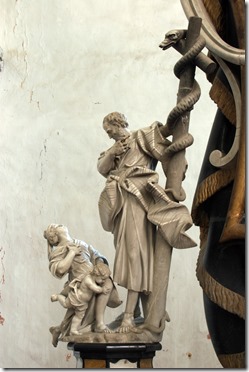
Jesus Ain’t No Snake-on-a-Stick
 Talk about biting the hand that feeds you.
Talk about biting the hand that feeds you.
In Numbers 21 God has just helped the Israelites defeat a Canaanite king. They are heading to the Promised Land, and they start complaining about the food.
“Why have you brought us up out of Egypt to die in the wilderness? For there is no food and no water, and we detest this miserable food.” (Numbers 21:5 NRSV)
Actually it only sounds like they are complaining about the food; what they are really complaining about is the desert.
Nobody likes the desert.
When you’re in the desert, slavery in Egypt looks good and manna from heaven is detestable.
Why can’t we go straight from Egypt to the Promised Land? Why is there always a desert?
But there is always a desert, and we never want to go through it. Just bring me my milk and honey and skip the manna appetizer, please.
All this bitching—sorry, but that’s what it is, it’s not mere complaining or grumbling—about the manna really ticks God off, so he sends in a bunch of poisonous serpents that start biting people.
Don’t like manna? Eat this. Tastes like chicken.
People are dying right and left, so they go to Moses and apologize. “We’re sorry! Can you get God to get rid of these snakes!”
Moses prays, but instead of getting rid of the snakes, God gives them another one. He has Moses make a snake out of bronze and put it on a pole. Whenever an Israelite got bit, they just had to look at the snake-on-a-stick, and they wouldn’t die. Problem solved.
Flash forward seven hundred years later to 2 Kings 18. Hezekiah is king at the tender age of 25, and the first thing he does is tear down all the “high places”—worship sites out in the country where people bring sacrifices without having to go all the way to Jerusalem.
Sacrifices were supposed to be done at the Temple in Jerusalem, not far away where all kinds of nefarious practices might enter in.
The second thing young Hezekiah did was to cut down the pole that Moses had used in the desert and to break in pieces the bronze serpent. People were worshiping the serpent, bringing offerings to it.
They even had given it a name: Nehushtan.
As if a snake-on-a-stick is ever anything more than just a snake-on-a-stick.
As if a snake-on-a-stick can heal us.
Make us whole.
That’s the lure of idolatry, thinking that some sacred thing can bring wholeness to us, can fill the gaps that just won’t get filled, can make that hole—that emptiness—finally go away.
Shoot, forget the sacred thing; some of us are so desperate that we’ll try anything, sacred or profane, to avoid the trauma, the pain, the loneliness, the fear.
We’ll follow anything that promises to get us to the Promised Land without having to face the desert and deal with the thirst, the hunger, and the heat.
We’ll even follow Jesus if that’s what he’ll promise.
I think a lot of us treat Jesus-on-the-cross like he’s a snake-on-a-stick. We want him to get us to the land of milk and honey without having to go through the desert.
To paraphrase our theology, we think that Jesus went through the desert so that we don’t have to.
The gospel of Matthew presents Jesus as the New Moses, come to deliver his people out of slavery and into life, and neither the old nor the new Moses avoided the desert or promised that we would either.
The journey to resurrection-life is always through the cross, not around it.
The way to the Promised Land always goes through the desert.
God promised to walk with us through the desert, a pillar of cloud by day and of fire by night, leading us, protecting us, providing for us.
All the way to new life.
Image by © Can Stock Photo Inc. / zatletic
 I am a lifelong student of the Bible, and have been a pastor for over twenty-five years. My desire through this blog is to help people see things in the intersection of Scripture and real life that they might have missed. The careless handling of the Bible is causing a lot of problems in our churches and our culture--and is literally turning people away from the church, and, sometimes, God. I hope to treat Scripture with the respect it deserves, and, even if you don't agree with what I say, give you some insight.
Feel free to leave a comment. I promise to respond to you. All I ask is that you be respectful in your comments.
I am a lifelong student of the Bible, and have been a pastor for over twenty-five years. My desire through this blog is to help people see things in the intersection of Scripture and real life that they might have missed. The careless handling of the Bible is causing a lot of problems in our churches and our culture--and is literally turning people away from the church, and, sometimes, God. I hope to treat Scripture with the respect it deserves, and, even if you don't agree with what I say, give you some insight.
Feel free to leave a comment. I promise to respond to you. All I ask is that you be respectful in your comments. 
Connect with Me